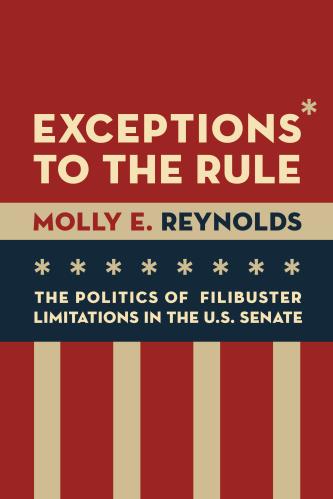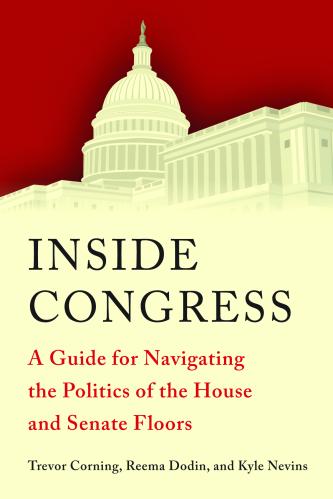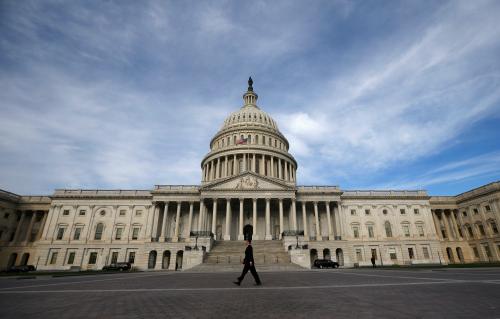While considering legislation to repeal (and possibly replace) the Affordable Care Act last month, the Senate was able to bypass the typical 60-vote requirement to pass legislation by using the reconciliation process. Reconciliation allows the Senate to consider mandatory spending and/or revenue changes, and limits debate on those changes to 20 hours. Because debate is limited, there is no need to garner 60 votes to end debate, allowing reconciliation bills to pass with a simple majority of 51 votes.
However, reconciliation is just one of several special circumstances that allow the Senate to get around the filibuster rule. Molly Reynolds, Fellow in Governance Studies at the Brookings Institution, just released an in-depth examination of these special cases in her new book Exceptions to the Rule. Earlier this month, a panel of experts who have been intently watching Congress’s latest reconciliation efforts met for a panel to discuss the lessons learned from the book in the context of the current Republican Senate agenda.
At the outset, Molly outlined some of the lessons taken from her book, including the political pressures faced by the majority party when pursuing a reconciliation bill. However, she also cautioned that, “reconciliation is not a magic bullet.” The reconciliation process, in addition preventing a filibuster in the Senate, also sets out a number of other rules and restrictions that limit what can be accomplished in a reconciliation bill.
Sarah Kliff, a Senior Editor at Vox who has written extensively on the recent ACA repeal efforts, expanded on the limits that the reconciliation process put on Republican senators’ abilities to achieve some of their policy priorities. Specifically, she cites age band rating regulations for insurance and Planned Parenthood funding as two “key goals” that reconciliation rules prevented Republicans from accomplishing. She also pointed out that, technically speaking, senators had the power to reject the advice of the parliamentarian (the Senate official who advises whether an issue can be considered under reconciliation or not) and include the agenda items they wanted, but chose not to. One potential explanation she offered for this choice was that reconciliation restrictions, in addition to limiting the scope of the reconciliation bill, also give Senators something to “blame” when progress isn’t made on an issue.
As the Wall Street Journal’s Richard Rubin notes, avoiding blame is especially important for Senators facing tough reelection races in 2018 and 2020. This will likely have an impact on tax reform, he argues, which the Senate currently plans to consider under the fiscal year 2018 reconciliation bill. Dean Heller (R-Nev.), as the ideological “median member” of the Republican caucus in the Senate and of the Senate Finance committee, would be a pivotal vote under reconciliation. Because Heller is also facing intense electoral pressure, he (and other Senators facing tough reelection prospects) will be key players as the process moves forward.
But whose blame exactly will Senators be trying to avoid? Norm Ornstein, Resident Scholar at the American Enterprise Institute, argues that the tax reform issues Republicans plan to take up under reconciliation are largely determined by media coverage. “When you look at some of the things that have been on the [Republican Party’s] wish list [for tax reform], the simplistic element of just wiping out the estate tax,” and other simplistic tax reform talking points, Ornstein asserts, are a direct effort to appease conservative media, and subsequently conservative political donors. He reiterates the point later in the event, making clear that the “intimidation members feel” when they fear being attacked in the popular media is a significant driver of their policy choices.
https://www.youtube.com/watch?v=vLEVSjjyDak?&start=2790&end=2895
https://www.youtube.com/watch?v=vLEVSjjyDak?&start=4753&end=4791
As the Senate moves on to consideration of the fiscal year 2018 reconciliation bill, Reynolds’ Exceptions to the Rule will offer key insights into the motivating factors driving Senators’ policy choices under reconciliation. As the process moves forward, look for congressional Republicans to try and strike a balance between the electoral needs of individual members and the collective goals of their party.
To get a jump-start on the upcoming FY 18 Reconciliation coverage, copies of Exceptions to the Rule are available from the Brookings Institution Press.
Quinn Bornstein contributed to this post.








Commentary
Do reconciliation rules help Senators avoid blame for failure?
September 1, 2017